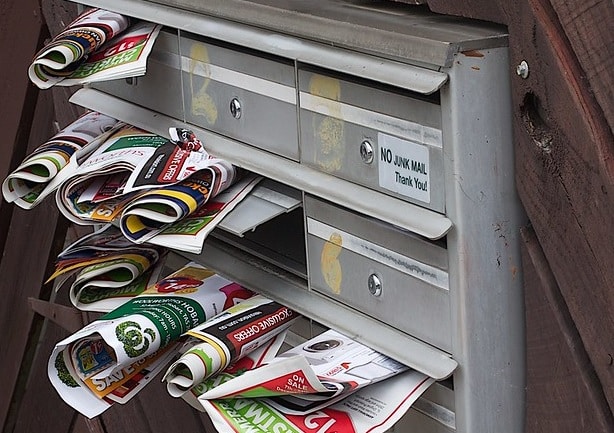
Some consider them welcome savings opportunities. Others consider them junk mail. But when bundles of coupon inserts and store circulars end up washing down the street and clogging storm drains, there’s only one thing to call them – a problem.
Norman, Oklahoma is far from the only city that’s had to grapple with the challenges posed by what can be euphemistically called “unsolicited advertising material,” otherwise known as bagged bunches of coupons and ads tossed into your driveway or front yard. But it has become the latest city to try to find a way to prevent these bundles from becoming litter. And if they succeed, other communities with similar problems might take notice.
The city council is considering an ordinance that would restrict how and where advertising material can be delivered to city residents. But doing so is a tricky business, because publishers who distribute this material have defeated similar efforts that are too restrictive, leading many communities to shrug and decide there’s just not much they can do about it.
But Norman council members say they’ve been fielding constituent complaints for more than a decade, about unwanted inserts that litter neighborhoods, disintegrate in the rain and end up going down storm drains. On one recent walk, council member Lee Hall said at a committee meeting last week, she “collected probably over a hundred, some intact, some completely destroyed – plus the plastic bags.” She said she’s heard from residents that the people responsible for delivering the material “literally are not even trying to get it in the yard. They may just be tossing them, and there can be a whole block of papers that are landing in the street.”
So assistant city attorney Anthony Purinton has come up with an idea. The city is planning a stormwater drain cleanup effort, so Purinton proposed separating out all of the ads and inserts gathered during the cleanup and weighing them, to gauge just how much ends up polluting the city’s storm drains.
“Being able to present that evidence to a judge is invaluable,” he told the council. “Because it’s one thing to say, I’ve seen these in the city storm grates. It’s another to say, these are the actual amounts that are ending up in the waterways.”
It’s a key distinction, because calling unwanted advertising “litter” and proving that it’s litter are two different things, according to the law. Several years ago, a dispute over circular and coupon deliveries ended up in federal court, after a suburban Detroit township cracked down and the Detroit newspaper responsible for the deliveries fought back. Orion Township, Michigan began ticketing the newspaper for littering, for delivering “unrequested and undesired newspapers and/or flyers.” And the newspaper sued, calling the tickets a violation of its free speech rights. “First Amendment protection extends equally to both requested and unrequested speech,” the paper argued.
The two sides settled, after the township agreed to stop issuing tickets, and the newspaper agreed to improve its opt-out system. But the dispute may have spooked other communities from doing anything about unwanted inserts, for fear of free-speech lawsuits.
A similar dispute played out a year later in the city of Lexington, Kentucky, where the local paper sued the city over a new ordinance requiring all unsolicited materials to be delivered to doorsteps or mailboxes, instead of haphazardly tossed onto properties. A federal appeals court ruled in favor of the city, which argued it was not restricting free speech but only restricting where the material can be delivered.
Armed with evidence of soggy old inserts pulled from storm drains, the city of Norman hopes to be able to restrict where the material can be delivered as well, without preventing it from being delivered at all. Purinton argues such a solution should please everyone. “The city has an interest in making sure we’re living in a nice place, a clean place,” he said. In addition, the publishers and advertisers should be happy because “we’re regulating it in a manner that will enable them to reach more people.” After all, if the material ends up in the street, no one is going to see it. And “if it rains the day after,” Purinton said, “you can’t clip the coupons when they’re destroyed.”
So if your neighborhood is facing the scourge of unwanted ads and coupon inserts, keep your eye on Norman, Oklahoma to see if their proposed solution sticks. And then maybe your community can come up with a similar happy compromise that will please everyone – residents, advertisers and First Amendment attorneys alike.











Why not contact the company and request removal from their delivery list?
What is the name of this circular?